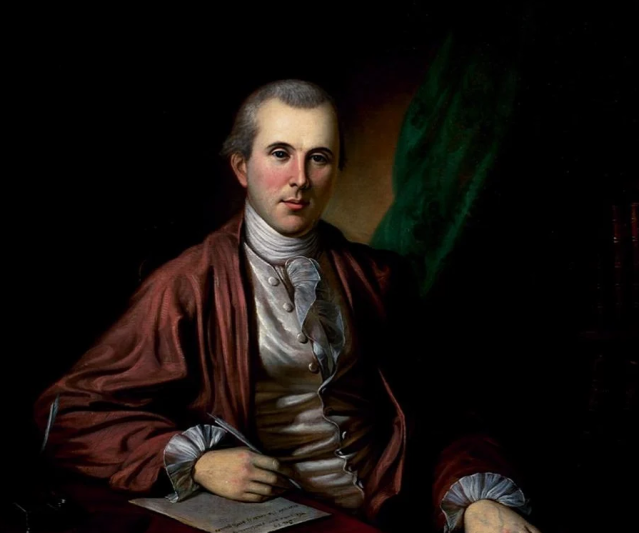Thus said Benjamin Rush. Every time somebody says that the USA is a democracy, kindly correct them!
 Written by TARA ROSS:
Written by TARA ROSS:
On this day in 1789, a signer of the Declaration of Independence writes a letter to John Adams. The letter sounds harsh to modern ears. And yet it makes perfect sense.
“A simple democracy,” Benjamin Rush wrote, “or an unbalanced republic, is one of the greatest of evils.”
Wait. Democracy . . . . evil?! What on earth could he mean?
Simple. Our Founders knew that, as a matter of history, simple democracies tend to implode. Naturally, they wanted to avoid such a catastrophe.
Perhaps you’ve heard the analogy: A democracy is two wolves and a sheep voting on what’s for dinner. (Yikes!) Our Founders knew this dynamic, too. Pure democracies cannot prevent bare majorities from tyrannizing over large minority groups. Too often, they crumble under the influence of bare majorities or emotional mobs.
Unsurprisingly, then, our Founders did not create a simple democracy. They worked to create something even better.
But what could they do? They still valued self-governance. They’d just fought an entire Revolution because they had no representation in Parliament. They weren’t about to ditch the concept of democracy entirely. In the end, they came up with a unique solution: Our Constitution blends the best elements of democracy (self-governance), republicanism (deliberation and compromise) and federalism (state-by-state action). The many checks and balances in our Constitution are meant to protect our freedom.
Power is separated among three branches of our federal government. Neither the President nor the judiciary is supposed to encroach upon the legislative function. Moreover, most power is left to the states–or to the people themselves! The Constitution requires super-majorities to take some actions, such as to amend the Constitution or to override a presidential veto. And we have an Electoral College.
When we ignore such safeguards in our Constitution, we jeopardize our own liberty. Both Rush and Adams would have understood that.
Perhaps more modern Americans need to know this history, too.
Benjamin Rush was a signer of the United States Declaration of Independence and a civic leader in Philadelphia, where he was a physician, politician, social reformer, humanitarian, and educator and the founder of Dickinson College. Rush attended the Continental Congress. His later self-description there was: “He aimed right.” He served as Surgeon General of the Continental Army and became a professor of chemistry, medical theory, and clinical practice at the University of Pennsylvania.
Rush was a leader of the American Enlightenment and an enthusiastic supporter of the American Revolution. He was a leader in Pennsylvania’s ratification of the Constitution in 1788. He was prominent in many reforms, especially in the areas of medicine and education. He opposed slavery, advocated free public schools, and sought improved education for women and a more enlightened penal system.



When the Constitution was being implemented throughout the 13 States, many thought that the States would run roughshod over the Federal Government.
Ironically, the States began to allow or enable the Federal government to take over some of their responsibilities and obligations. The Constitution does not grant the states the authority to transfer any of their powers to the Federal Government, not does the Constitution give the Federal Government authority to take them.
Many of the issues involved in the 1st Amendment. rights via the 5th Amendment. Initially, the Bill of Rights only applied to the Federal Government. The Federal Government could not enable or create a national church. Nothing in the Constitution prevented 7 States from having established Churches. By the late 1830s, the last State would get out of the church business when they closed down their Church. However, the last of the State laws favoring a certain Church remained on the books until the 1870s. That last act was a person must belong to what used to be the Established Church in order to hold a state job, including the right to be elected to the House of Representative and US Senate.
The original view was that is the citizens of the States wanted an Equal Protection Law, they should have put it in their Constitution.
LikeLiked by 1 person
Great Post Stella.
LikeLiked by 1 person
When Congress dithers, POTUS and SCOTUS legislate. Thus we get DACA and Brown vs Board of Education. It turned out to be a very flexible form of govenment.
LikeLike
In the Roman Republic, the Senate dithered and they gained Emperors.
A Loss of Traditional Values, Debt, and Corruption the collapse of the Roman Republic.
One can add the Inability to Control their Borders added to the above brought about the collapse of the Western Roman Empire.
I began hearing that the US was going the way of Ancient Rome in the 1960s while I was in high school. I did not believe it. I put those things together and I began believing that claim.
Leftists are fond of quoting Santayana, another Leftist who said, “Those who do not learn the lessons of the past are condemned to repeat the mistakes.”
I say our leaders learned those lessons and carefully replicated the above mistakes.
LikeLiked by 1 person